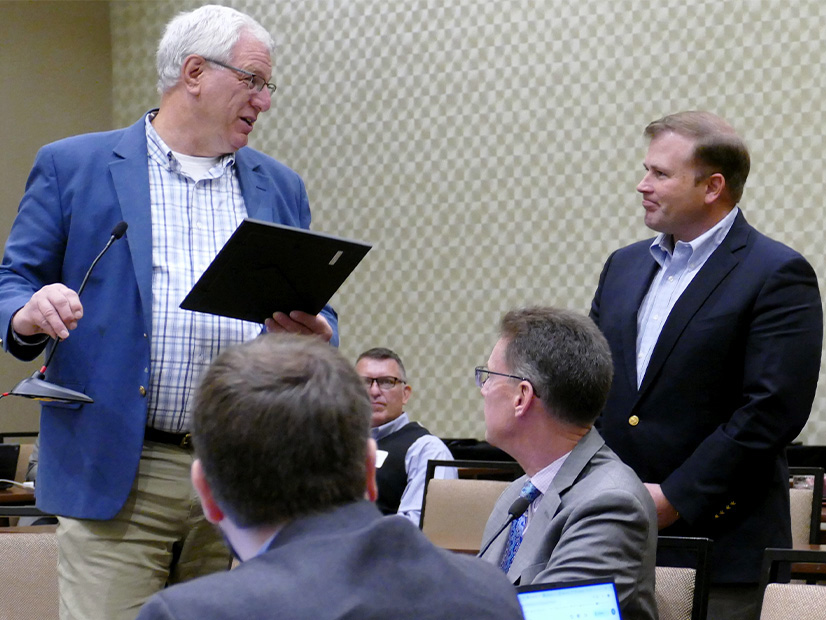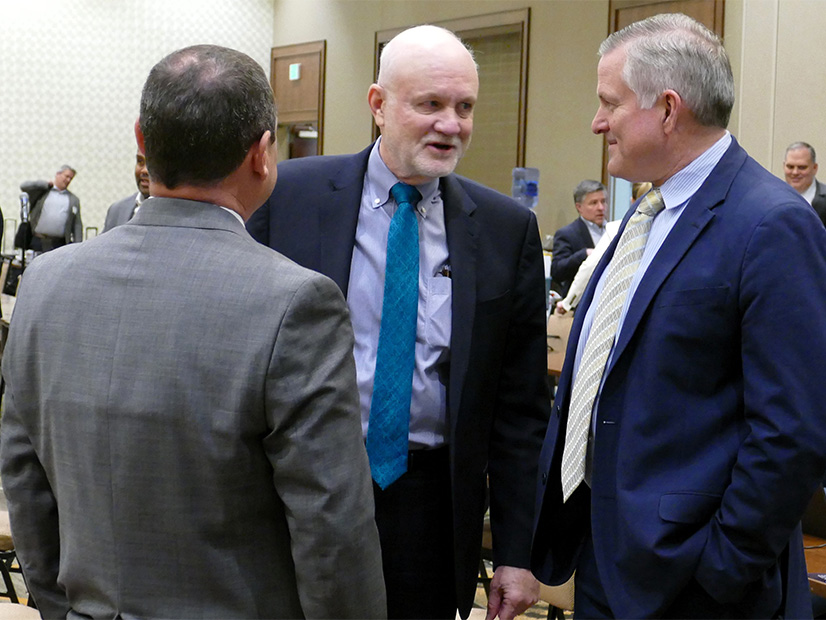
FERC’s Christie Lauds State Regulators, RSC
AURORA, Colo. — FERC Commissioner Mark Christie, who still refers to himself as a state regulator after 17 years on the Virginia State Corporation Commission, offered words of praise and encouragement for SPP’s state regulators in his first appearance before the RTO and its Regional State Committee.
“I’ve always been very admiring of this RSC structure,” Christie told the RTO’s regulators and stakeholders during the RSC’s May 6 meeting. “I’m pleased to be here watching the action of this committee I’ve heard about for 20 years now that I’ve been so envious of.
“Your job is incredibly important. I’m obviously very adamant about the state role of RTOs. Someone once told me, ‘You’re like a state regulator on loan to FERC,’ so I’ll take that,” he added. “But I’m adamant about the state’s role because I’m adamant about protecting consumers. Everything that as a state regulator we do, and you all on the front lines, should be about putting consumers first.”
As most of the state commissioners that constitute the RSC listened attentively, Christie described resource adequacy as the key element of grid reliability, one of two major issues facing state regulators.
“Resource adequacy means what generation resources will get built, which ones get retired,” he said. “You — I should say, we — at the state level are on the frontlines because you’re the ones who are approving the construction of new generating resources. You’re the ones who are overseeing retirements. That’s why your role is actually the most important in the whole regulatory universe.”
Christie said the second major issue facing state regulators is consumer confidence because they’re “on the front line of rising power prices.”
“They’re going up, and they’re going up at a higher rate than it was 10 years ago,” he said. “When you approve a rate increase, and I know this from 17 years of having been a state regulator, it’s going to go right into people’s monthly bills. That’s one thing about being a state regulator is that you hear about it. You live among the people who you’re impacting, and that’s why state regulators are so important. I trust you all to know what is best for your state.”
The feeling was mutual. RSC President John Tuma of Minnesota thanked Christie for attending, saying: “We still welcome you as a full state commissioner, ever though you carry that other title.”
RSC Celebrates 20 Years
The RSC’s agenda, which included the quarterly stakeholder briefing, was scheduled for four hours. It went three-plus. Credit Tuma, who ran a tight ship that shaved off more than an hour of discussion. “Today may be a new land speed record,” cracked John Cupparo, SPP’s board chair.
The early finish allowed attendees to begin their commemoration of the RSC’s 20th anniversary 45 minutes early.
“I can’t believe it’s been 20 years for the RSC,” CEO Barbara Sugg said. “There’s lots for us to celebrate.”
“As someone who spent a good chunk of their career in the non-RTO West and experienced regional issues and trying to pull together participation from the regulatory community and others, this is a very challenging effort,” Sugg said. “That continues today. From that experience, the RSC group that we have is a special and powerful thing.”
The Advanced Power Alliance’s Steve Gaw was the only one of the RSC’s original six founding members present for the event. A Missouri regulator at the time and also involved in standing up the Organization of MISO States, Gaw said both groups first had to determine how much legal authority they had.
Former FERC Chair Pat Wood’s standard market design, released after the 2003 Northeast blackout, helped set some guardrails for future RSC members. It took about 18 months for the group to agree on the committee’s bylaws and its responsibilities.
“The key to the success of these groups has been about … collaboration and about building bridges and being dedicated [to] trying to find a way to work together to come up with things that would produce a positive result,” Gaw said. “If the commissioners had gone with an attitude of saying, ‘I have to have my state’s interest and it’s … the only thing that I’m in here for,’ nothing would have ever moved forward.”
SPP credits the committee with developing and implementing funding mechanisms that have helped build more than $12 billion of transmission lines since 2006; producing policies governing cost allocation for upgrades facilitating the integration of more than 33 GW of wind energy in the region; and for its role in helping refine resource adequacy methodologies.
“When the RSC was formed, critics questioned whether representatives of such a diverse group of states could reach consensus on anything,” SPP general counsel Paul Suskie, the RSC’s staff secretary, said in a news release. “For more than two decades, the group has navigated complex challenges, fostered innovation in our industry and contributed to the resilience of an electric grid that serves millions of customers across the central United States.”
REAL Team Work Approved
Despite the shortened meeting, the RSC still approved several revision requests, including two brought forward by its Resource and Energy Adequacy Leadership (REAL) Team. Both passed unanimously, as did all seven of the committee’s voting items.
The tariff changes, RR605 and RR616, were approved by the Markets and Operating Policy Committee in April. They are the result of RSC directives last October to clarify resources must be available if they’re going to be accounted for in the resource adequacy construct and in some load-responsible entities’ accreditation.
RR605 would define an authorized outage and criteria, add requirements for resources’ availability during both the summer and winter seasons (unless on an authorized outage), and help load-responsible entities and generation owners better understand when to submit resource adequacy capacity in providing workbooks to meet their obligation. RR616 would ensure any outage not approved by the SPP balancing authority and not an outside management control event is accounted for in performance-based accreditation.
The RSC also endorsed the REAL Team’s price-formation policy to dispatch resources based on the true obligation and price of the system using the obligation without the impact of the load shed and emergency energy assistance. The policy protects resources that hold day-ahead positions.
South Dakota’s Kristie Fiegen, who chairs the REAL Team, said it is close to approving a winter planning resource margin and a fuel assurance policy. Both should be coming to stakeholders, regulators and staff during their July and August meetings. (See SPP, Members Close in on Fuel Policy, Base PRM.)
“We’ve had a lot of policies, but [the winter PRM] is the most time-consuming,” Fiegen said.
The REAL Team has spent six months on the PRM tariff revision, but it’s had its side effects.
“I feel like we’ve become a family this past year,” she said.
“Chair Fiegen has done a wonderful job leading these family discussions of the REAL Team,” COO Lanny Nickell said. “We haven’t yet evolved into a food fight, so that’s a good thing.”
JTIQ NTCs Possible This Year
Casey Cathey, SPP’s new engineering vice president, told the RSC that staff hopes the Board of Directors will issue construction permits by year’s end for the five projects in the Joint Transmission Interconnection Queue.
SPP and MISO staffs and potential transmission owners are pursuing a direct billing approach that would require SPP to modify a revision request (RR620), which would implement RSC-approved cost-allocation policies for JTIQ projects. MOPC delayed taking action on RR620 during its April meeting.
“We need to ensure we have the revision request locked up,” Cathey said, noting staff determined its current approach would be the most efficient way to administer the JTIQ settlement process.
SPP and MISO have agreed to assign 90% of the JTIQ portfolio’s $1.06 billion in costs for its five projects to generation. Load will cover the remaining 10%. (See MISO, SPP Propose 90-10 Cost Split for JTIQ Projects.)
RSC Welcomes Missouri’s Hahn
The committee welcomed Missouri’s Kayla Hahn, who chairs the state’s Public Service Commission, as its 47th member over the past 20 years and honored the service of recent RSC members Will McAdams (Texas) and Scott Rupp (Missouri).
Two potential future members also were present for the meeting: Mary Throne, chair of the Wyoming PSC, attended in person, while Utah Commissioner John Harvey listened in virtually.
“We look forward to your participation in the RSC and Wyoming’s participation in the RSC as part of the RTO West expansion into the Rocky Mountain area,” Sugg told Throne.
Wyoming is one of four states that, with Colorado, will make up much of SPP’s RTO footprint in the Western Interconnection. Arizona and Utah will increase the grid operator’s footprint to 17 states.


